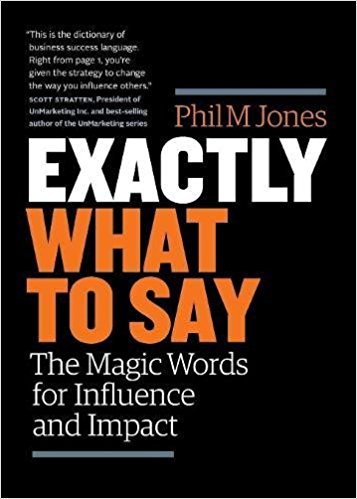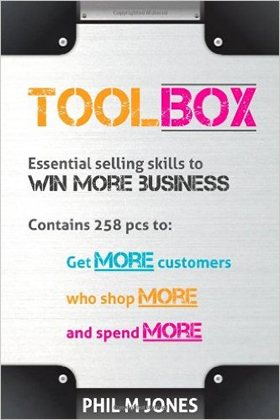Grant Leboff: Phil, one of the things you talk about, In fact you’ve got a whole book dedicated to it is the importance of language and you call these phrases magic words.
Phil M Jones: Yeah.
Grant Leboff: Just tell me a little bit more about why it’s so important and maybe some examples of magic words.
Phil M Jones: Yeah, sure. I work with a lot of sales companies, big organizations at the same product, the same environment. They have all of the same things at their disposal to be successful and people wonder why other people are better than others and, yes, attitude’s important, activities are important in success but so is as what you do when you turn up. Quite often the difference between people who are good and those that are great is those that are great know exactly what to say, when to say and how to make it count. Those specific sets of words and it’s the words that people put into their day-to-day conversation when they’re looking to influence others that quite often get in their way. I do loads on this. We got a few minutes left in this interview so I want to make it concise and maybe talk about some of the don’t-dos rather than some of the do-dos.
One word that I’d love everybody who are listening to this right now to just cut out their vocabularies, that 4-letter C word. It might not be the one that you jump to but the 4-letter C word I’d love people to ban is that word cost. When people talk about the cost of their service and quite often this comes at you from a customer, right? How much does this cost? What are the psychological connotations to when you hear that word cost? We automatically jump into a defence mode. We start to think that this is going to be painful, the things that cost us in our lives quite literally a one-way traffic in the opposite direction. Swap the word cost for investment and see how it changes what people think about it. You’re proud of your investments, right? These have some long-term view. You expect returns from your investment. Don’t your customers expect returns from working with you? Talk about things as something different. I would always talk about what my customers were investing in my services and then I make the decision easy. Same when they’re talking about price.
Another quick tip when talking about price is to insert a word before you mention the prices. Another 4-letter word, insert the word just before you ever speak the number and it shifts the emphasis in the sentence. If I said we could do that for just 5,432 pounds, the emphasis moves to the word just, as opposed to the word thousand. The number sounds smaller just in the way that it’s being delivered. There are some simple things.
One other classic from a magic word’s point of view, I’ll just share one with you. It’s two words, probably made me more money than anything else that I’ve ever used when selling to people face to face. A lot of people get stuck getting decision, right? When stuck getting decision, they don’t know what to do. They’re looking for some guidance from somewhere up there or something to say, “What should I do?” They’re looking for social proof to what you can do and you can trick a social proof with language because people follow what other people like them who have done in the past. We’re looking for some psychological trigger that we can get people to feel confident with.
In conversation, if I use the two magic words, most people, and then just talk in terms of what most people can do, I can tell you what I think you should do. I could say to a prospect stuck getting decision, “What most people would do in your circumstance is this, this, this, and this.” You cannot help but think, “Hey, I’m most people. If you’re thinking that you’re most people, you’ll then follow the track psychologically towards that very outcome that’s just being presented, so basically I’ve told you what to do but you chose it. I got dozens of sets of words like that and I think learning them but not just learning how they work and why they work, but making them part of every day vocabulary, your levels of influence and persuasion when in negotiation with your consumers can turn you into something awesome really.
My genuine view point of what a sales person is, is that we are decision catalysts or more easily put we’re a professional mind-maker uppers, so if you can develop language that helps people make their mind up quicker, be it towards a yes or a no but steer it more towards yes then quite easily we can get people to do stuff they wouldn’t normally do. I’ll try and prove this to you for a second because I got a set of words that can get people to agree to do just about anything before they even know what the thing is. I’m hoping you might help me out with this. You don’t mind do me a favor, right?
Grant Leboff: Sure.
Phil M Jones: That simple set of words, the request of a favor gets a unanimous yes in the other direction before anybody knows what it is. Think where you can use that in your business, too, getting people to agree to help you before they even know what the help is, wonderful referrals, wonderful for testimonials, wonderful for insight, and wonderful to get people to understand the next thing they might want to buy from you. There’s a flavour of it. I’d love to talk with thy own words because I know how important they are.
Grant Leboff: I agree and as a writer, I’m using language all the time as I know you do. I try to emphasize to all my customers the importance of language and I think people are dismissive, and in an online word now where often the first interaction with any business is what they read, isn’t it, and what they hear. It’s so important if you could just share with us perhaps a couple more phrases before we leave today just so people can use in their business because I think this is an important area that people neglect.
Phil M Jones: Yeah. Some people are scared of rejection, right? Biggest thing I hear time and time again. I try and give people a rejection freeway of being able to introduce just about anything to just about anybody. Again, we have to understand a little bit more about how subconscious works but before I talk about the subconscious brain part, let’s talk about a three-letter word that has huge impact in conversation. Three-letter word is the word ‘but’ and must understand what it does, right? I don’t know if you’ve ever been in a conversation in the past where maybe like a teacher or an employer, or a sports coach, or somebody who said, “Look around you, you’re wonderful at what you do here. We really appreciate all the extra effort that you bring to the team… but…” what do you then remember?
Grant Leboff: Everything after that.
Phil M Jones: Everything that follows, right? We can use it to negate whatever we previously said if we’re intelligent about it. Then me saying you might want to look at this, what if I said to you, “I’m not sure if this is for you.” See, when I phrase a question towards you, this condition and point it to the left or the right of you, it allows you to move in your thoughts. When I say to you, “I’m not sure if this is for you,” naturally, what do you want to know?
Grant Leboff: What is it?
Phil M Jones: What is this, right? It means that you move towards wanting to understand the outcome. If I then put the word but at the end of that sentence, subconscious brain hears something completely different than his. You might want to look at this. I can use that as a way of introducing my products and services to anybody anytime by saying, “Look, I’m not sure if this is for you but…” I can then build on that by saying, “You wouldn’t happen to know.” Think about how you can use this for getting referrals of the front end. “I’m not sure if it’s for you, but, you wouldn’t happen to know, maybe just one person who looks like this” and then describe your perfect target market. No, I didn’t say do you know. If I say you wouldn’t happen to know, by alternative, what I’ve done is thrown in the challenge. I’ve said, “You probably don’t.” If I tell you, “You can’t do something.” What does it make you want to do.
Grant Leboff: Do it.
Phil M Jones: We’re creating motivations towards action and language but doing it really talking towards people is already a hardwired system of how they behave, so it happens subconsciously. Does it work with all of the people all of the time? Just most, most of the time, and that’s enough to build massive results on it.
There may be small changes to the spoken word in this transcript in order make it more readable.



